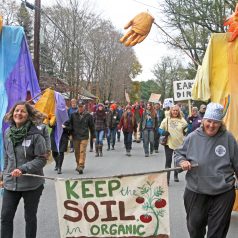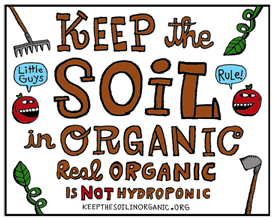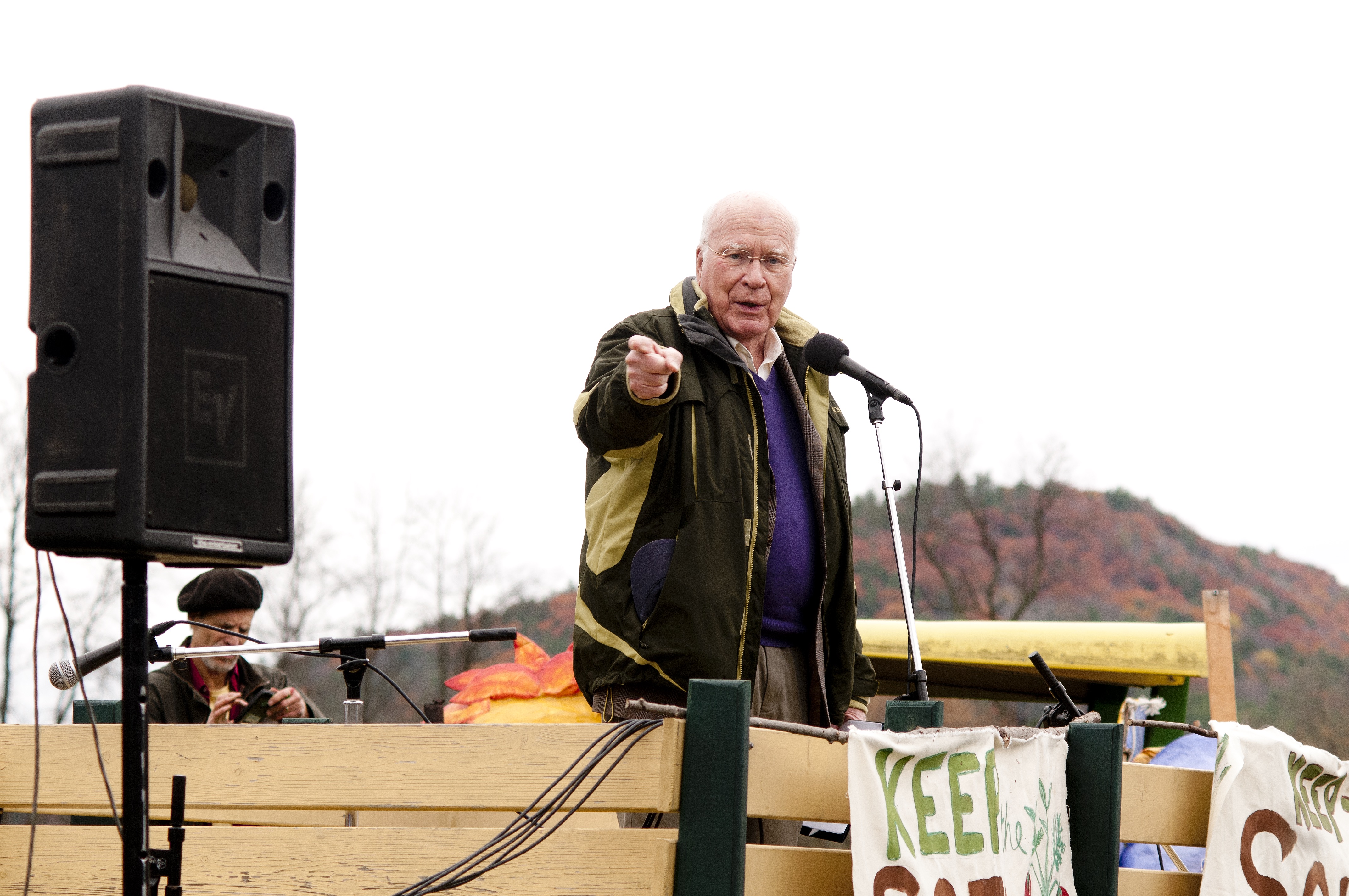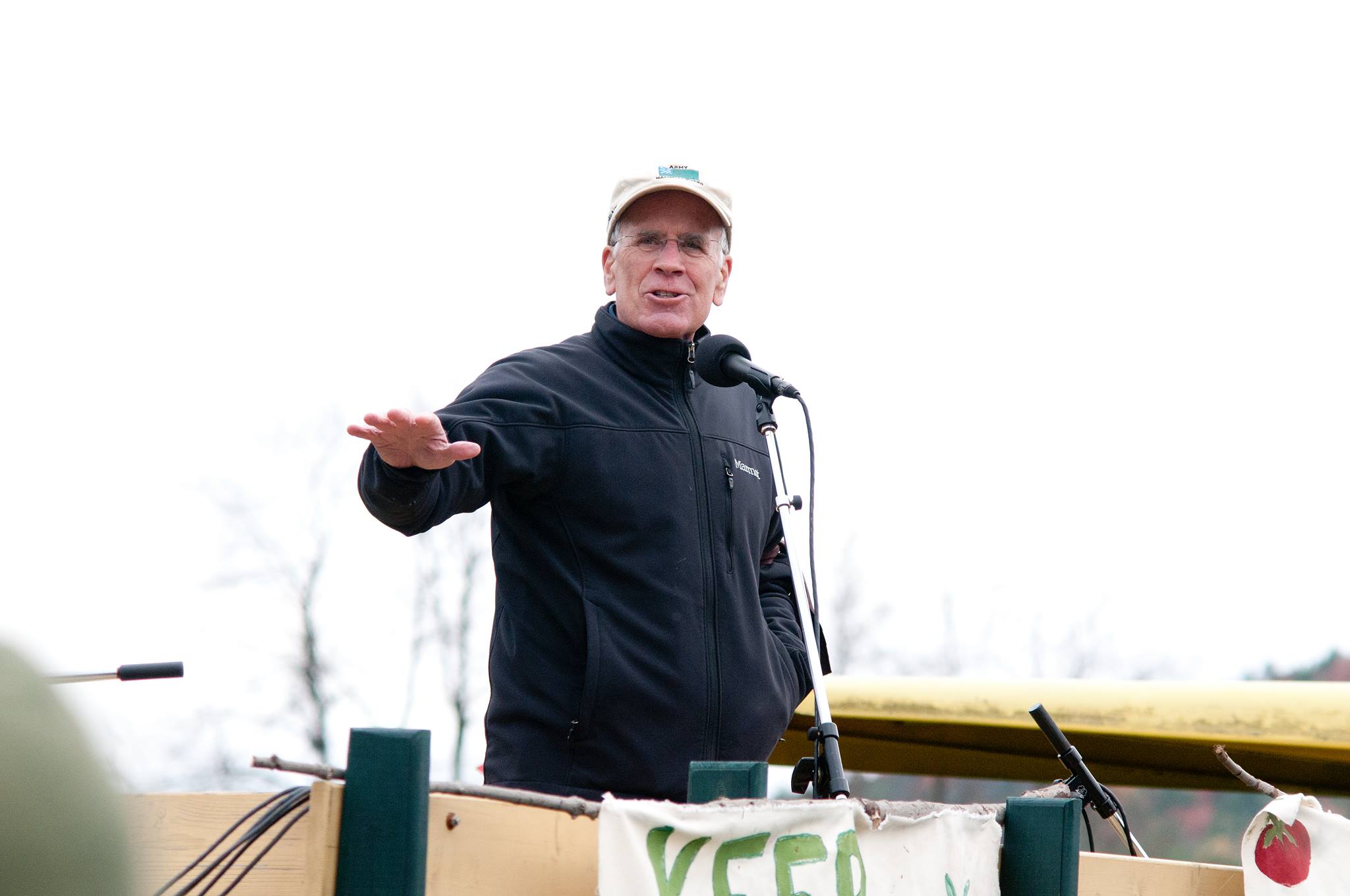
Keeping the Soil in Organic
What comes to mind when you think of organically-grown produce? Does it conjure a pastoral scene with fields of fertile soil dotted with lush, healthy plants? What about hydroponic ‘vegetable factories’ and ‘vertical farms’ where production is hermetically sealed in huge warehouses filled with LED lights, plastic tubing, and nutrient pumps? Should industrial-scale hydroponic operations like these qualify for organic certification, or should fertile soil remain the non-negotiable foundation of organic farming?
The USDA’s National Organic Standards Board (NOSB) has been granted the authority to make this decision, and in a series of narrow votes at a meeting in November 2017, they chose to allow the majority of these operators to remain a part of the organic program. This decision dealt a disappointing blow to many long-time organic farmers and organic farming advocates who had been working tirelessly to protect the integrity of the organic label. On one side of the argument is a multimillion-dollar hydroponic industry with powerful lobbyists. The global hydroponic market is projected to hit $490 million by 2023. In the United States, approximately 100 hydroponic operations are already certified organic including berry giant, Driscoll’s. On the other side of the debate are organic farming pioneers who are now mourning what they see as the devaluation of the organic brand they fought for decades to establish.

Dave Chapman, a longtime Vermont-based organic tomato farmer, along with a small army of other organic farmers and organic farming advocates, packed the room at the November 2017 NOSB meeting in a last-ditch effort to protect the integrity of the organic label. They organized dozens of rallies across the country leading up to the Jacksonville meeting and inspired a small army of organic advocates to champion the cause.
A Rally in the Valley
One such rally took place right here in Vermont in October of 2016 and was dubbed the Rally in the Valley. The rally drew over 250 people who shared the belief that all good farming begins with the soil, including over 100 organic farmers from Vermont, Maine, New Hampshire, New York, and Pennsylvania. Congressman Peter Welch, Senator Patrick Leahy, and legendary organic farming expert Eliot Coleman were part of the lineup of elected officials and organic farming leaders who addressed the crowd that day, urging those in attendance to keep the pressure on the Department of Agriculture.
The US government is alone among developed countries in granting the much-desired “organic” label to hydroponic growers. Hydroponic production is a soil-less process that has long been the norm in industrial-scale conventional greenhouse production. Now it is fast becoming the norm in organic certification for several major crops, such as tomatoes and berries. As Chapman points out, by changing the fertilizer brew in their mixing tanks to “natural” (but highly processed) soluble fertilizers, and then switching to “approved” pesticides, the industrial-scale hydroponic producers can miraculously become “organic” overnight.
Experts say the explosive growth in hydroponic imports may force some organic farmers out of business in as little as five years. Farmers in Vermont are already feeling the impact of the influx of “fauxganic” produce and are seeing their wholesale orders reduced in favor of the cheaper hydroponically-grown produce. Local organic tomato farmers Mia & Freeman Allen of Mountainyard Farm in Ripton, VT were among those in attendance at the Rally in the Valley and are feeling the effects of this change. According to Mia, ” How confusing to learn that the “USDA Certified Organic” label no longer applies to only soil-grown produce. We believe that the fundamental principle of organic agriculture is a healthy soil teeming with mycorrhizal life.”
Why Should Consumers Care?
First and foremost, this issue matters because we care deeply about our local organic farmers. They are an integral part of the fabric of this community and our rural economy is dependent upon their success. This decision is a direct threat to their livelihood. Another reason to care stems from the fact that the traditional organic system of agriculture not only reduces the use of certain fertilizers and pesticides but also contributes to the health of the soil and the rest of the environment, thanks, in part, to its ability to sequester carbon from atmospheric CO2. Organic philosophy is rooted in building soil fertility. When the USDA first established organic standards, they specified the tenets of organic farming to be as follows: “Soil is the source of life. Soil quality and balance are essential to the long-term future of agriculture. Healthy plants, animals and humans result from balanced, biologically-active soil.” It’s clear: all of the benefits organic farming offers to health and climate begin with fertile soil.
According to Chapman, “Organic farming is based on enhancing and cultivating the wonderful balance of the biological systems in the soil. It isn’t just about replacing chemical fertilizers with “natural” fertilizers. What I care about is learning to work with these infinitely complex biological systems. I think there is such a beauty and grace to organic farming. After 35 years as an organic farmer, I still know very little. I have been to many organic farms, and to many hydroponic farms. I greatly prefer the organic farms. That is what I want to support. This is where I want to work. This is who I want to live next to. This is who I want to buy food from.”
What Can Consumers Do?
- Vote with your food dollars by purchasing organic tomatoes and berries from local farmers. Although USDA’s National Organic Program has allowed hydroponic operations to be certified organic, Vermont Organic Farmers (VOF) does not certify hydroponically grown produce.
- Shop seasonally. When we buy fruits and vegetables in their appropriate seasons, we can buy them from local farmers and be certain about their growing practices.
- Establish a demand for soil-grown organic produce.When buying organic produce that isn’t local, contact the growers and ask about their growing methods.
- Join the Real Organic Project
A New Organic Label?
This winter, a growing group of farmers and eaters came together to form the Real Organic Project. The Real Organic Project will work to support real organic farming through a number of efforts, starting with the creation of a new “Add-On” label to represent real organic farming. It will use USDA certification as a base, but it will have a small number of critical additional requirements. These will differentiate it from the CAFOs, HYDROs, and import cheaters that are currently USDA certified.
This group grew out of several meetings of Vermont farmers who believed that the USDA label was no longer something that could represent them. That small group of Vermonters has grown quickly into a national group. This amazing group of organic advocates has gathered to build something new.
Standards Board – The Real Organic Project has a 15-member Standards Board (listed below), based on the model of the NOSB, but with much greater representation from the organic community. The 15 volunteers have a wealth of experience in both farming and regulation. There are 9 farmer members, as well as representatives from NGOs, stores, consumers, scientists, and certifiers.
The group includes 5 former NOSB members, as well as leading farmers and advocates from across the country. They will meet in March to set the first standards. They will continue to meet once a year after that to review and update. This first year there will be a pilot project with a small number of farms to test the certifying process and work out the details.
Advisory Board – There is also a distinguished Advisory Board that currently has 18 members, including 4 former NOSB members and 3 current NOSB members. It also includes many well known organic pioneers such as Eliot Coleman and Fred Kirschenmann.
Executive Board – And finally, there is an Executive Board of 5 people that includes one current NOSB member.
These boards will work together to reconnect and unite our community. Their intent is transformational. They will create a label that we can trust again.
We can only succeed with your support. Go to realorganicproject.org to become a member. Make a donation to help make this new label into a reality. We can reclaim the meaning of the organic label together!


